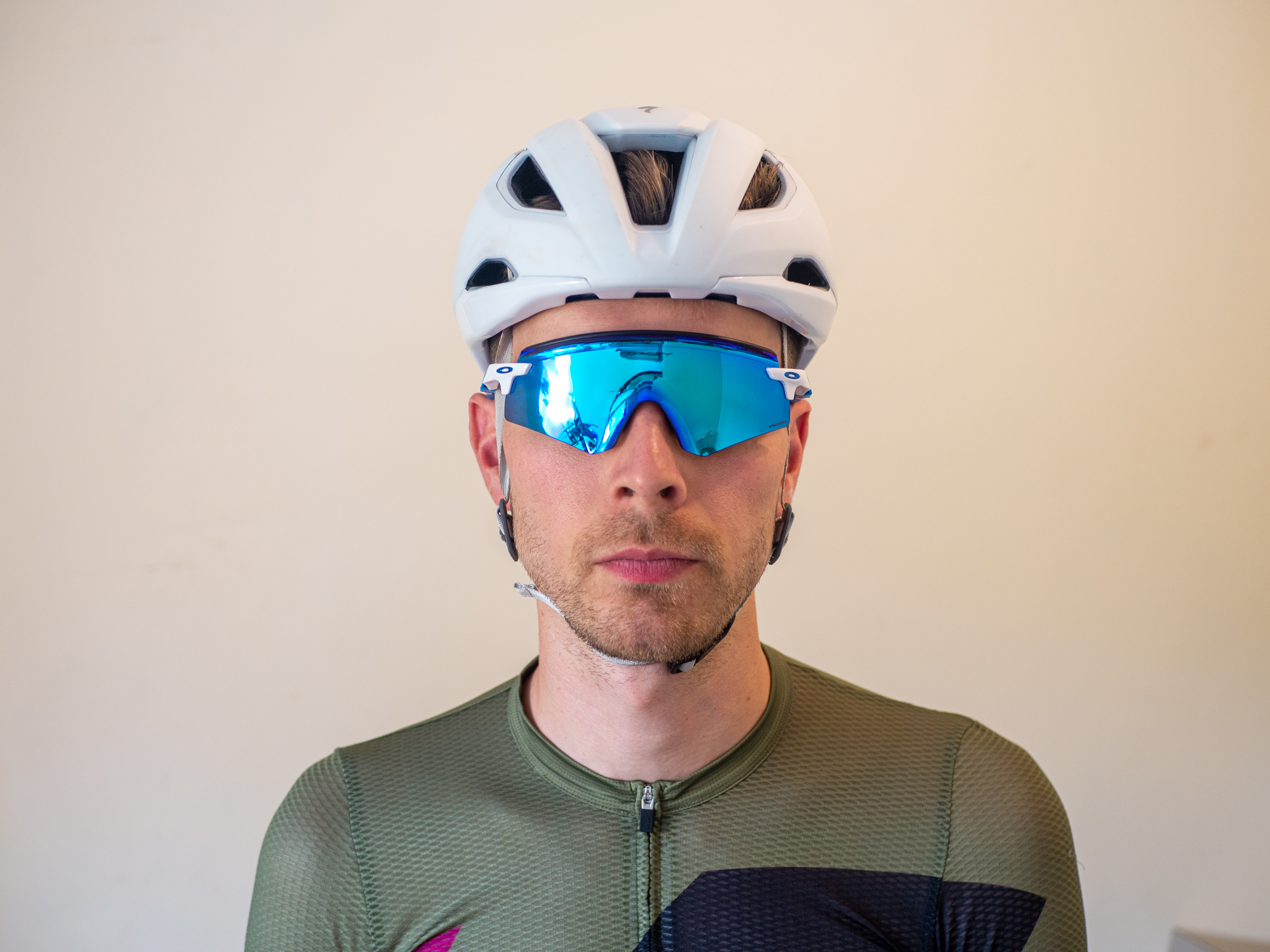
The Specialized S-Works Evade III is a range-topping aero road helmet, launched in 2022, used by a handful of professional teams including Soudal QuickStep and SD Worx.
It is a unisex helmet, and unlike the Prevail III helmet which focuses on ventilation, the Evade III has its focus primarily aimed at aerodynamics. Proving its aero credentials, it recently came a close second in our huge wind tunnel helmet test, behind only the POC Procen Air.
But given the time-trial aesthetics putting many riders off wearing the POC helmet, does that make the S-Works Evade the defacto winner? It's certainly one of the best aero helmets you can buy today.
It is complete with MIPS Air Node rotational impact tech inside, and although not included, it can also accommodate the 'ANGI' sensor which will automatically phone home in the case of a sudden or serious impact.
It is the third iteration of Specialized's go-fast helmet, and its launch came with a big surprise. For an aero helmet designed and launched by a brand that seemingly thrives off bold marketing claims, I was confused to hear the brand say that aerodynamically speaking, it was no faster than its predecessor.
Instead of finding an aerodynamic gain, the American brand focussed on something else: Ventilation. There's no bolder strategy than changing the narrative, and that's what the Evade III did.
In recent years, temperature has been a fast-growing area of performance enhancement. For example, the Ineos Grenadiers directeur sportif, Zak Dempster, recently told me that all of their 2024 Tour de France team have heat chambers in their homes, helping them to acclimatise ahead of the race. So it stands to reason that a helmet that can help the rider stay cooler will enable better performance.
By opening up the vents at the front, pairing it with bigger exhaust vents at the rear, and adding in what it calls a diffuser, Specialized says it was able to make the Evade III helmet better ventilated than its predecessor while maintaining the same aerodynamic performance.
With that in mind, is the Evade III not merely one of the best aero helmets, but one of the best road bike helmets full stop? Spoiler alert: I think it is.
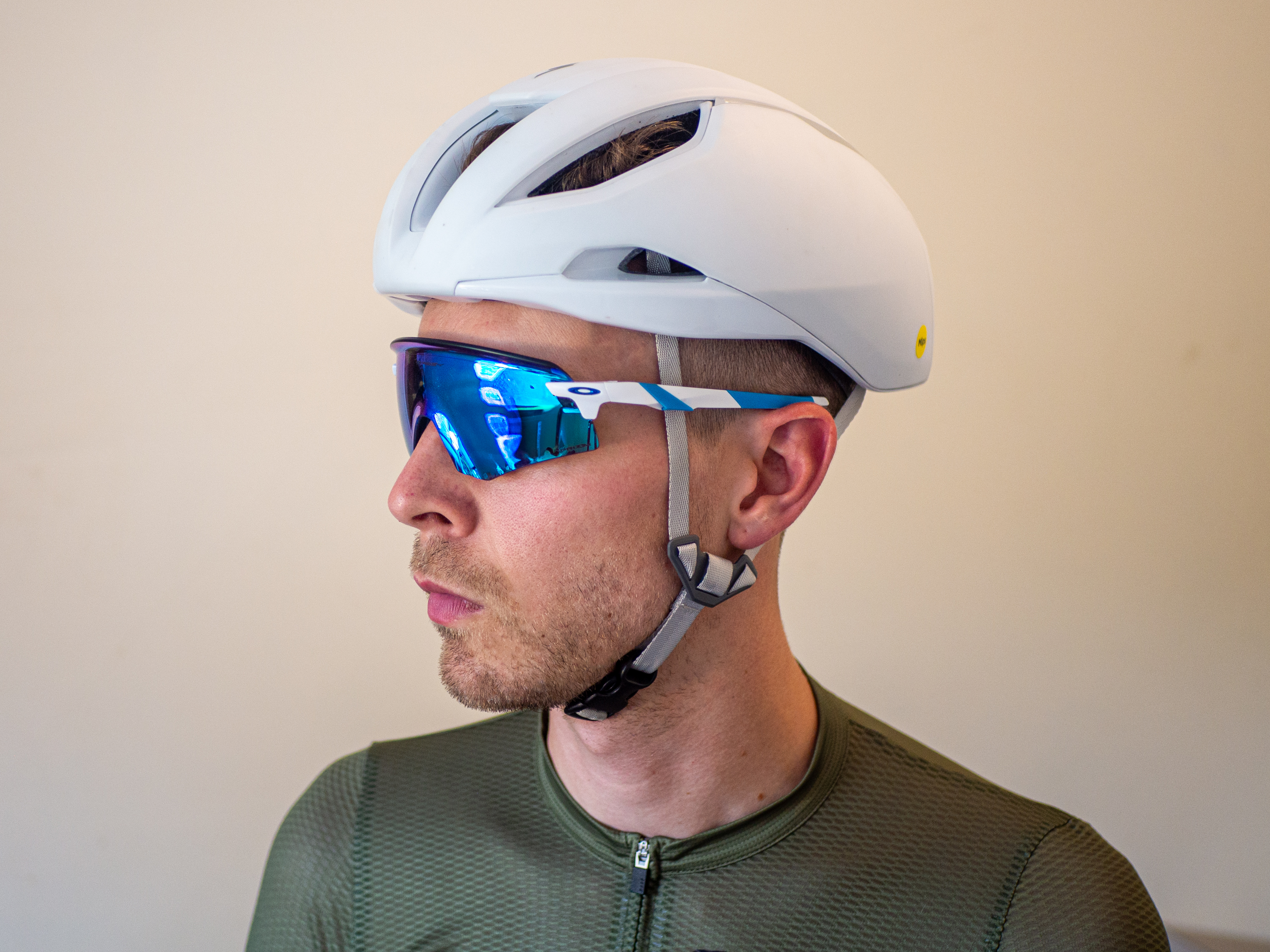
Design and specifications
Going back to basics, the Evade III has three large vents at the front, alongside two smaller vents along the flanks which are primarily for sunglasses storage. These vents angle downwards slightly, so I find you need to flip glasses upside down when storing them here to avoid the lens sitting below the brow of the helmet and in the line of vision.
Three internal channels sit on the inside of the brow, allowing airflow past the brow pad and across the forehead. Inside the helmet, the traditional expanded polystyrene (EPS) is designed with three channels that travel from front to back, letting air pass the top of the head quickly.
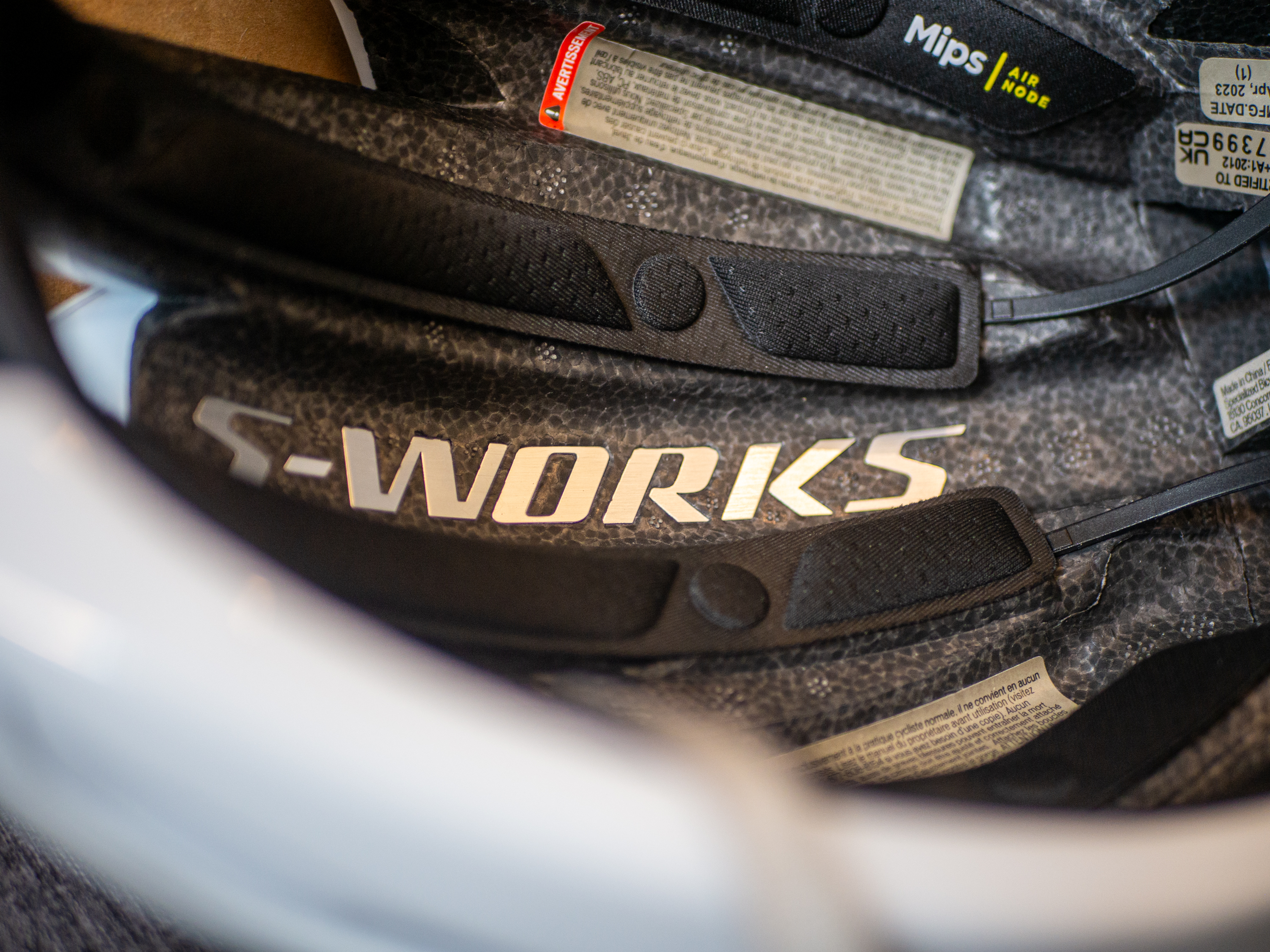
On the base of the central channel is a brushed silver S-Works logo that adds a touch of premium class to the design. This is matched by two similar flashes of silver on the outside of the helmet. Unlike the Kask Elemento or the POC helmet spotted at the Tour recently, there's no carbon fibre in use.
The pads are minimal and feature the entirely unobtrusive Mips Air Node rotational impact protection technology. The rear retention cradle is operated using a small proprietary dial, with an easy-to-use vertical adjustment too.
The straps, off-white in colour, are narrower than competitors and therefore better for those who want to avoid tan lines. They aren't adjustable for height, but they sit a comfortable distance beneath my ears - a complement that cannot be handed to the POC Omne helmets or the Van Rysel FCR.
The off-white colour isn't the best for cleanliness, because as sweat dries it discolours them, causing them to look a little second-hand. At the end of the straps, a standard buckle clip keeps them together, rather than the Fidlock magnetic clip found on some competitors.
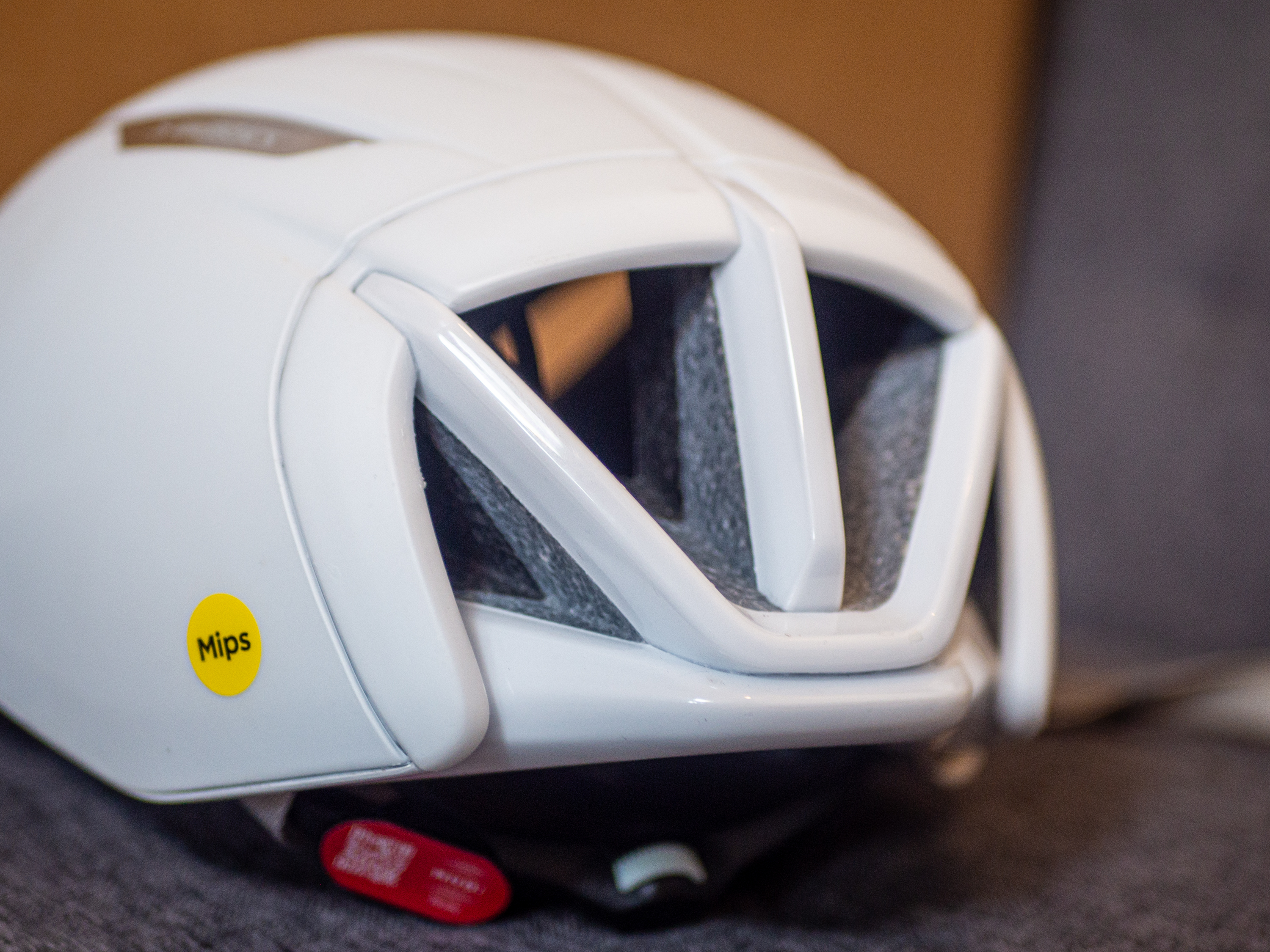
At the rear, the exhaust is made up of four triangular vents that sit together to form a rectangle. These vents look quite large from the outside, but viewed from inside the helmet they're actually quite small. Despite this, they do a good job of expelling warm air.
More than just holes to let warm air out, though, Specialized says this elongated rear serves an aerodynamic purpose as a diffuser, letting airflow remain attached for a fraction longer and improving the aerodynamic performance.
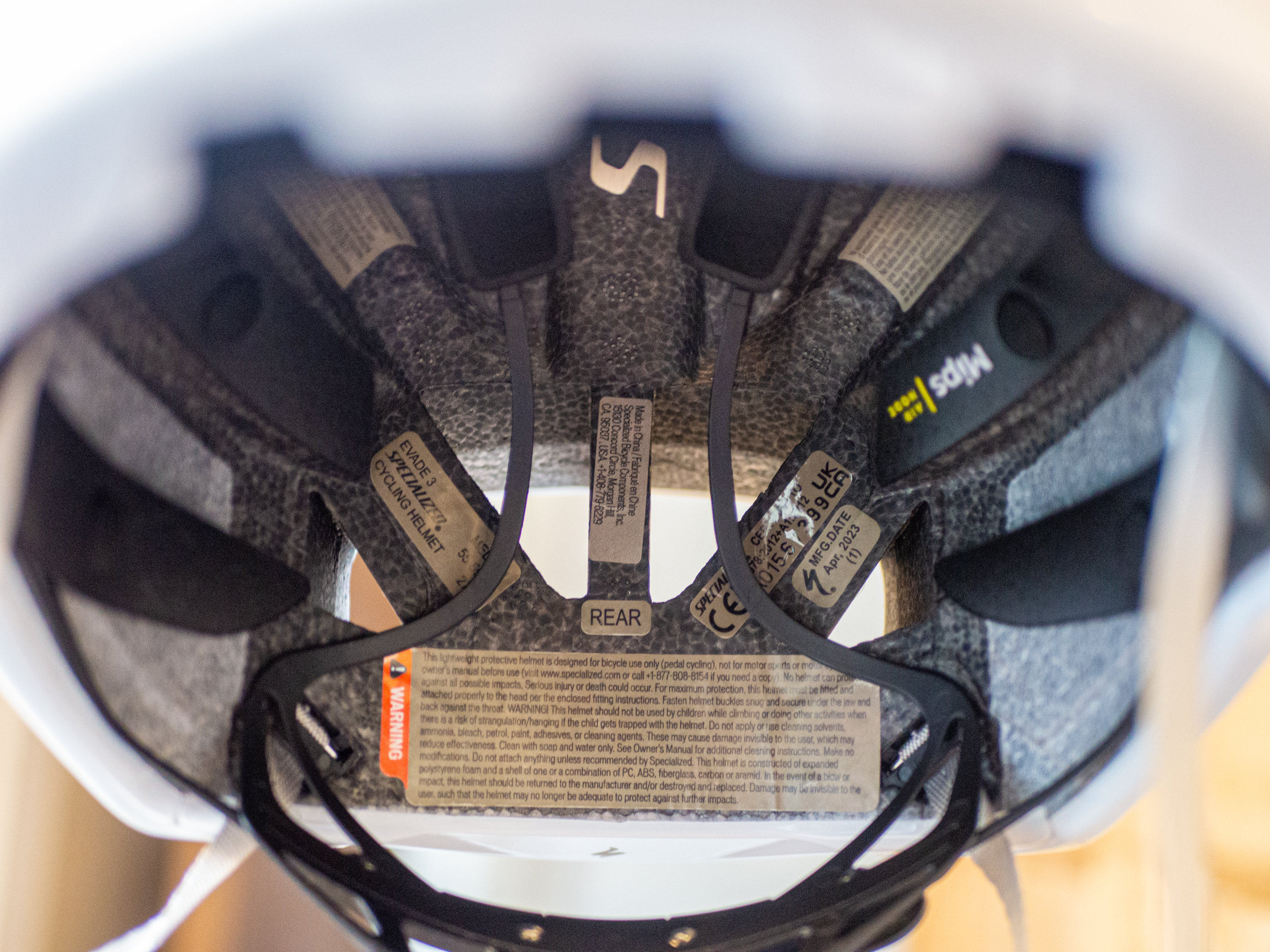
Performance
I've been using the Evade III for two years and it has long featured in our buying guides for road helmets and aero-specific helmets. In recent months, I have spent time testing every helmet featured in our wind tunnel test, and yet the Evade III is the one I pick up when I'm not specifically testing something, and that's because it performs very well in every area. The data available to us suggests it's safe and fast, and I have found it to be comfortable, well-ventilated and ultimately it's easy to forget I'm wearing it.
I'll start with safety, as this should be the first priority of a helmet purchase. As always, it's a difficult one to quantify. It features MIPS rotational impact protection and can accommodate the ANGI sensor, but the actual ability of a helmet to protect against concussion will depend on how well it fits your head shape, and of course, the severity and angle of the impact.
All helmets are designed to pass minimum industry standards on impact protection, and the Evade is no different, but the independent testing performed by Virginia Tech University backs up the safety credentials even further. It rated it at the highest possible five stars, and while its score of 10.93 puts it as only the 49th-best helmet in their testing, that's a good result against helmets of all genres.
Aerodynamically speaking, as mentioned above, it came a second in our wind tunnel test. Worn by Cyclingnews Tech Writer, Tom Wieckowski, in the Silverstone Sports Engineering Hub wind tunnel, the average CdA across four yaw angles (0, 5, 10 and 15 degrees) was 0.3523.
That mightn't mean very much on its own, so let me translate. If you were to ride for 40km at 250 watts on a flat road with no wind while wearing the Evade, it would take 1 hour, 3 minutes and 2 seconds (accounting of course for the bike and clothing setup used in our testing protocol). That was the second-best result in our test, only seven seconds slower than the POC Procen Air which won.
It was 24 seconds faster than the S-Works Prevail III, and 47 seconds faster than the slowest helmet on test, the POC Ventral. Of course, your exact mileage may vary, but in our testing, the Evade III is one of the fastest helmets around.

Moving onto ventilation, and having tested the Evade alongside dozens of competitors in conditions up to 30-plus Celsius heat, I am comfortable in saying the ventilation performance of the Evade III is among the best.
It's not quite to the breathability levels of the Prevail III or the Uvex Surge, both of which have huge open vents across the entire head, but it matches more 'all-rounder' helmets such as the Giro Eclipse, and easily outperforms the more expensive Kask Elemento in my experience. I've never felt uncomfortably hot in the Evade and would happily choose it for a race day in a heatwave.
Finally, it's worth talking about style. I think the Evade III looks great, but I'm conscious my opinion isn't important; style will always be an individual thing. Importantly, though, I've not met anyone who would choose to wear the POC Procen Air over the Evade. It might be faster, but there's no denying its looks are polarising. Everyone I've questioned on this matter would take the seven-second deficit in a heartbeat.
Value
At a retail price of £250.00 / $299.00, there's no denying the Evade III is an expensive helmet. If you're looking for a budget-friendly model, this probably isn't it. The Van Rysel FCR Pro helmet would be my recommendation there.
But when you consider the Evade's performance in safety, comfort, ventilation and aerodynamics, it's among the best on all counts, so I think there's an argument for the value it provides.
Given the price of the Procen Air is £360 and the Kask Elemento is £350, it's far from the most expensive option on the market, yet it performs just as well in most regards, if not better on average.
Verdict
The Evade III helmet is not entirely without its flaws. The off-white straps are quick to become dirty, and the angle of the sunglass storage vents put them at an awkward angle, but those are minor in the bigger picture.
And that bigger picture is one of a premium helmet that is among the safest and fastest on the market, is competitively lightweight, looks great, and is forget-you're-wearing-it comfortable no matter the temperature.
I would wear it on the road, in a race, and even on gravel. I think it excels everywhere, and if you're in the market for a high-end road helmet, it's hard to find a reason why you shouldn't too.







